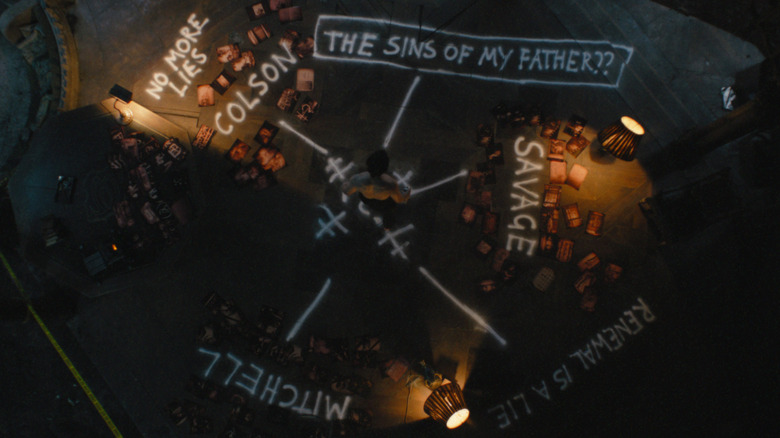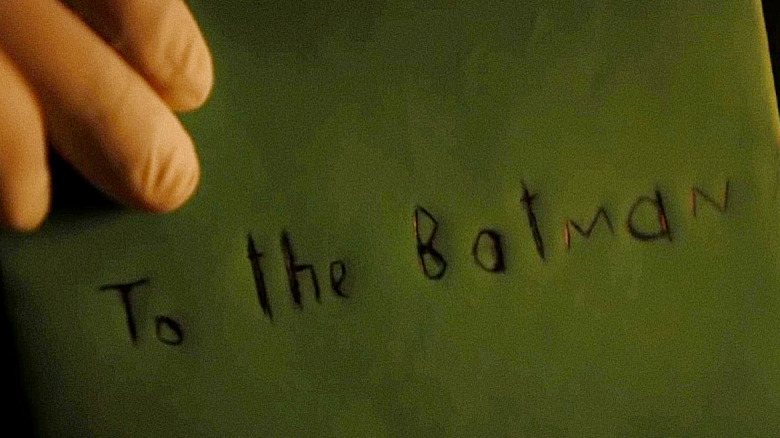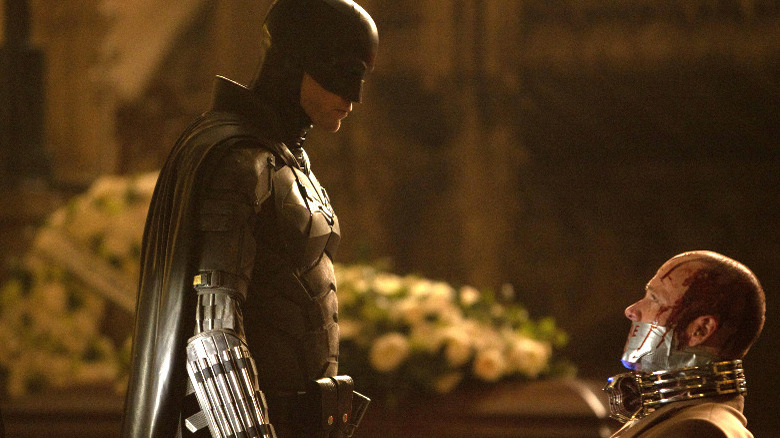The Batman Finally Lets Batman Be The World's Greatest Detective
Yes, the nuances of Batman as a character — be it the layers inherent within his decision to protect a crumbling Gotham City or the dichotomies ever-present between his two identities — have had many, many live-action iterations to date. Be it Tim Burton's gothic and fantastical vision that colored the world of the caped crusader or Christopher Nolan's iteration of a relatively grounded, "cinematic reality," these films managed to steer away from helming hackneyed re-interpretations while still remaining (somewhat) loyal to the character's comic book roots.
However, no live-action adaptation has completely surrendered itself to the masked vigilante's "the world's greatest detective moniker," at least not in the way Matt Reeves' "The Batman" does. Reeves' vision of the titular figure is greatly informed by key character tenets and storylines from "The Long Halloween" and "Batman: Year One," which delved deep into how Bruce/Batman mastered the art of crime-solving and put it to good (in fact, brilliant use). It is rare for a superhero film to be authentic to its roots while developing an identity and legacy of its own. "The Batman" not only succeeds in achieving so but also lets Batman utilize one of the deadliest weapons in his arsenal: the ability to reach the heart of a crime-addled mystery.
Warning: spoilers ahead for "The Batman."
Doing the detective legwork
Right off the bat (cough), Batman plunges into the heart of the mystery after the brutal murder of Gotham major Don Mitchell Jr. (Rupert Penry-Jones), who happens to be the first of the Riddler's (Paul Dano) targets, as a part of his grand plan to unmask the truth about Gotham's elite. Our torn, emotionally battered hero is only two years into crime-fighting and has developed the habit of keeping meticulous journal entries about his nightly prowling, although he is perennially on the move in order to keep an eye on suspect individuals. In the aftermath of Mitchell Jr.'s murder, there's visible tension between Batman and the rest of the GCPD at the crime scene, and the perpetrator leaving behind a letter directly addressed to him does not help matters.
Right after Jim Gordon (Jeffrey Wright) finds the first cipher at the scene (a classic Riddler riddle: "What does a liar do when he's dead?"), it takes Batman merely minutes to solve it. Apart from his obvious riddle-solving abilities, Batman has an incredible eye for detail (as evidenced by how easily he was able to figure out the clues left in the rat contraption), and an obvious knowledge of ciphers, which he goes out solving by testing out probable patterns that are in sync with the Riddler's complex and volatile psychological profile. This is in sync with "Year One," in which Bruce perfects his detective skills by dabbling into forensics, martial arts, cryptography, and linguistics, to name a few fields. Although Bruce in "The Batman" is relatively new to his vigilantism, it is apparent that he has spent years perfecting his detective skills, perhaps with the understanding that he would undoubtedly need them to parse through the twisted psyches birthed by Gotham through the years.
"The Batman," of course, is noir-addled through and through, starting from the Riddler being inspired directly by The Zodiac Killer to the way in which the tense atmosphere is built, as it drips with grim, cynical melancholy. "The Batman" also wears its "Se7en" inspiration on its sleeve, right from Batman/Bruce's concern for the mayor's kid that heavily mirrors Somerset's demeanor in the opening minutes of David Fincher's hardboiled noir, to the way in which the unmasking of the truth is reminiscent of the trail of bodies that mimic the seven deadly sins. Reeves' vision for the film is a genuine love letter to the genre, but it is also a reinterpretation of the same within the Batman lore, which undoubtedly pays off in the best of ways.
'Riddle me this, Batman...'
The Riddler's final chapter in his saga of chaos was almost successful, thanks to the way he gathers an army of supporters towards the end. But the reason the plan ultimately fails is that the Riddler neglected to take one thing into account: Batman's resilience. The drive to reach the center of a labyrinth, no matter how convoluted the maze or how many dead ends and false starts abound, is the mark of an efficient detective, and Reeves' Batman embodies that quality right up till the end. When the Riddler's actions inevitably point towards a cover-up in the Wayne family, burdening the caped crusader's already anguish-ridden mind with the (probable) sins of the father, he marches on, despite the deeply personal conflict residing within his psyche.
So much so, he momentarily embraces the Bruce Wayne persona (much to his distaste, as his conversation with Alfred makes it clear that he deems that part of his identity as a sham) on two occasions: during Mitchell Jr.'s funeral and his meeting with crime boss Carmine Falcone. Both occasions warrant his presence if he is to unearth further clues, and the funeral sequence is the perfect example of the same, as he is able to learn a good deal just by merely observing. From realizing that Selina accompanied Falcone by merely looking at her leather boots (this is what prompts him to follow her in the first place, as her boots were pictured in the Mayor's photos with Annika) to probably being the only person to realize that the Riddler was present at the scene among the crowd, Bruce simply appears as a bystander but is far from being one.
The tense, heart-thumping sequence wherein Gil Colson has to solve the Riddler's puzzles in exchange for his life is expertly-crafted as well, as Batman is instantly able to provide the correct answers whilst being under an anxiety-inducing, time-sensitive scenario. The guy is obviously smart, boasting deft logical skills, but what makes Batman such a great detective is his ability to gauge the psychological patterns of another, which directs him towards solving the final clue to the Riddler's plan (although it is a bit too late by then). What drives the detective aspect of his character home, is the fact that beneath that heavy, heavy costume/armor, beneath the hard-boil shell of a brutal vigilante with stellar investigative skills, is a broken, grieving soul willing to fight for his city — no matter how arduous, cynical, or downright unhinged things get in Gotham City.
"The Batman" is currently playing in theaters.


